RECOMMENDED
Rajiv Joseph takes a provocative look at the human consequences of a despicable crime twelve years after its perpetration in his hit-and-miss World Premiere drama Mr. Wolf, a play I found powerful and affecting in its more realistic moments but frustrating and perplexing in its attempts at the poetic and profound. In either case, performances alone make it worth a look-see.
It’s nigh-on impossible to discuss Joseph’s latest play without spoilers, so proceed with caution.
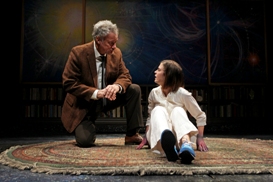 The Mr. Wolf in question seems at first glance to be about the farthest thing on earth from a criminal, let alone a monster. A university math professor is more like it, with his silver hair and beard, tweedy jacket and slacks, and scholarly manner, and indeed that turns out to be his line of work.
The Mr. Wolf in question seems at first glance to be about the farthest thing on earth from a criminal, let alone a monster. A university math professor is more like it, with his silver hair and beard, tweedy jacket and slacks, and scholarly manner, and indeed that turns out to be his line of work.
It soon becomes clear, however, that Mr. Wolf (John de Lancie) is no mere college prof and that teenaged Theresa (Emily James), with whom we first see him conversing about matters extraterrestrial, is neither daughter, niece, or even relative, but rather the almost grown child the not-so-goodly professor abducted some twelve years before. As for the persistent knocking now interrupting their chat, well it seems that the time has come for Mr. Wolf to pay the piper.
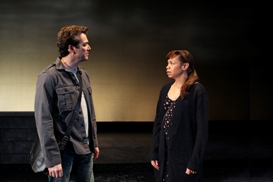 Cut to a support group for parents of kidnapped children and Emily’s father Michael (Jon Tenney), who like fellow group member Julie (Kwana Martinez), has held on steadfastly to the hope that his child is still alive despite any logical arguments to the contrary.
Cut to a support group for parents of kidnapped children and Emily’s father Michael (Jon Tenney), who like fellow group member Julie (Kwana Martinez), has held on steadfastly to the hope that his child is still alive despite any logical arguments to the contrary.
News of Therera’s rescue brings Michael’s wealthy former wife Hana (Tessa Auberjonois) back to the house she has allowed her ex to live in these past dozen years, and there she finds Michael and Julie living as husband and wife.
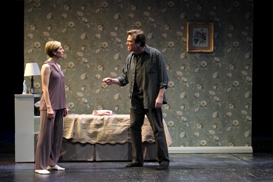 Michael and Hana may be united in their desire to be reunited with their long-lost child, but old resentments die hard, and Michael cannot forgive his ex-wife for having abandoned hope. As for Hana, if Michael thinks she’s going back to wherever she’s just come from, he’s got another thing coming.
Michael and Hana may be united in their desire to be reunited with their long-lost child, but old resentments die hard, and Michael cannot forgive his ex-wife for having abandoned hope. As for Hana, if Michael thinks she’s going back to wherever she’s just come from, he’s got another thing coming.
First and foremost for all concerned is Theresa’s welfare, far from a sure thing since the teenager has been reared so remotely from the outside world that she has no idea what a chocolate bar is, nor has she apparently ever worn a pair of shoes.
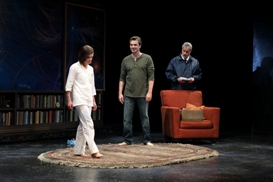 Both Michael and Hana are relieved to learn that there was nothing unseemly in their daughter’s relationship with her abductor. If anything, growing up under the tutelage of a mathematician has given Theresa considerable insight into the universe, on which she expounds with the intellect of someone several times her age.
Both Michael and Hana are relieved to learn that there was nothing unseemly in their daughter’s relationship with her abductor. If anything, growing up under the tutelage of a mathematician has given Theresa considerable insight into the universe, on which she expounds with the intellect of someone several times her age.
As described, Mr. Wolf could well be Movie Of The Week fodder, though anyone familiar with playwright Joseph’s previous work will know better than to expect anything mundane from the author of Gruesome Playground Injuries and Animals Out Of Paper, both of which got sensational L.A. productions last year.
I loved the later in particular, finding Joseph’s dialog “smart and biting.” Animals Out Of Paper was early Joseph, however, and this time round, I’m less of a fan. Though Joseph’s language in Mr. Wolf has been described as poetic, I found it more artificial than anything else. Overhear the playwright’s dialog in his debut play and you might think you were eavesdropping on real life. Unfortunately, such is often not the case when Theresa, Julie, Michael, Hana, and Mr. Wolf exchange words.
Only rarely do these characters seem to use everyday contractions. It may make sense for the erudite Mr. Wolf to have raised Theresa to do without them. (“I have bought you thing you have never seen” in lieu of “I’ve brought you things you’ve never seen”). But other characters seem to have learned their English on the printed page as well. (“Your father is here” and not “Your father’s here.” “I am happy for you” and not “I’m happy for you.”) And if that sounds poetic to some, well, it just sounds stilted to me.
Playwright Joseph’s musings on the universe and its infinite possibilities, including the notion that we all exist somewhere else in it as we do here, and Theresa’s oft-repeated mantra “My life is specific to me” may make perfect sense to the writer but I whatever points he was attempting to make whooshed over my head.
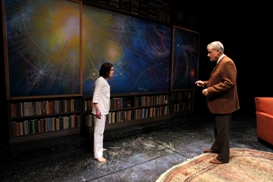 Theresa’s “incarceration” with Mr. Wolf raises questions as well. Shelves are filled with books, and the girl’s remark that “I know about a kiss. I’ve read about it” indicates that they’re not just mathematical tomes, yet when presented with a candy bar, she seems never even to have heard of such a phenomenon, let alone what chocolate is.
Theresa’s “incarceration” with Mr. Wolf raises questions as well. Shelves are filled with books, and the girl’s remark that “I know about a kiss. I’ve read about it” indicates that they’re not just mathematical tomes, yet when presented with a candy bar, she seems never even to have heard of such a phenomenon, let alone what chocolate is.
At his most straightforward, Joseph’s examination of the various ways we humans have of responding to tragedy in general—and to a kidnapping in particular—is an intriguing one. (We can either move on, i.e. give up on our missing children, or escape, i.e. die, or find them, i.e. Michael’s choice). Equally fascinating is Michael’s advice that Julie stop speaking to her missing daughter (“Every sentence spoken into thin air increases the thin air between you and them”) and the list of “rules” with which he has come up. (“Always be in pursuit. Do not sing Happy Birthday. Do not speak to them if they are not there.”)
The more closely Mr. Wolf sticks to reality, the more relatable it is … and the more gripping. Michael’s Act Two battles with Hana over what is best for them as Theresa’s parents—and for Theresa herself—have the ring of absolute truth to them, and kept me riveted.
It helps enormously that under David Emmes’ direction, Mr. Wolf is blessed with five superb performances.
Tenney has probably never been better, his Michael a mix of anger and hope and frustration and abiding paternal love, and he is matched by the compelling Auberjonois and the dynamic Martinez as two women fighting for both a man and a girl.
De Lancie gives us not only the disturbing mix of the paternal and the creepy that is the play’s titular character but also a pair of post-rescue figures, the doctor who examines Theresa and the FBI agent investigating her kidnapping, and he is absolutely terrific in all three roles. (It seems that Theresa sees Mr. Wolf in every male stranger of a certain age she meets.)
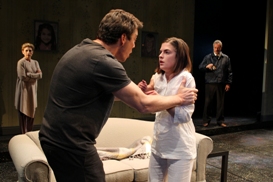 Best of all is Cal State Fullerton senior James, utterly captivating as the child-woman Mr. Wolf has raised. Wise beyond her years and yet radiant with childlike innocence, James captures Theresa’s contraditions to perfection in an auspicious South Coast Repertory debut.
Best of all is Cal State Fullerton senior James, utterly captivating as the child-woman Mr. Wolf has raised. Wise beyond her years and yet radiant with childlike innocence, James captures Theresa’s contraditions to perfection in an auspicious South Coast Repertory debut.
The star-filled night sky with which scenic designer Nephelie Andoyadis backs the production and Cricket S. Myer’s otherworldly musical soundtrack underline Mr. Wolf’s metaphysical pretentions. Leah Piehl’s costumes are her accustomed fine designs, and Lap Chi Chu’s lighting design is quite spectacular as well.
John Glore is dramaturg. Joshua Marchesi is production manager. Sue Karutz is stage manager.
Casting of Mr. Wolf’s entirely L.A.-based ensemble is by Joanne DeNaut, CSA. Leah Cassella is assistant director and Bradley Zipser production assistant.
Mr. Wolf joins the concurrently running Of Good Stock as this year’s two fully-staged World Premieres in South Coast Repertory’s annual Pacific Playwright’s Festival. I absolutely loved the latter. I have reservations about the former. Still, Mr. Wolf makes for some compelling viewing, and is sure to inspire plenty of discussion once the lights have gone back up. (Feel free to use this review as a starting-off point. Then talk amongst yourselves.)
South Coast Repertory, 655 Town Center Drive, Costa Mesa.
www.scr.org
–Steven Stanley
April 21, 2015
Photos: Debora Robinson/SCR
Tags: Jon Tenney, Orange County Theater Review, Rajiv Joseph, South Coast Repertory



 Since 2007, Steven Stanley's StageSceneLA.com has spotlighted the best in Southern California theater via reviews, interviews, and its annual StageSceneLA Scenies.
Since 2007, Steven Stanley's StageSceneLA.com has spotlighted the best in Southern California theater via reviews, interviews, and its annual StageSceneLA Scenies.







 COPYRIGHT 2025 STEVEN STANLEY :: DESIGN BY
COPYRIGHT 2025 STEVEN STANLEY :: DESIGN BY